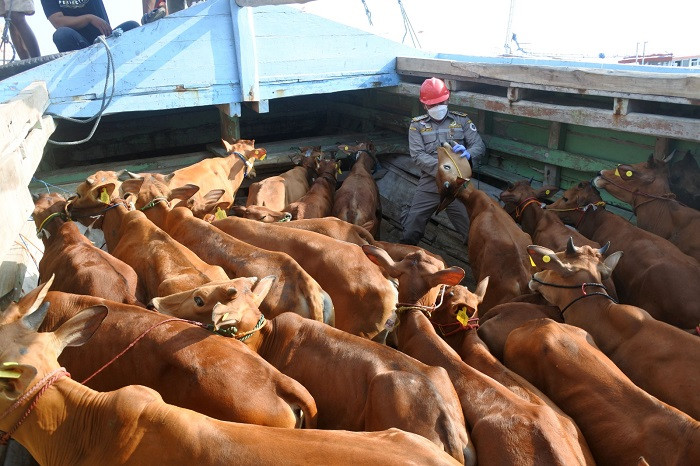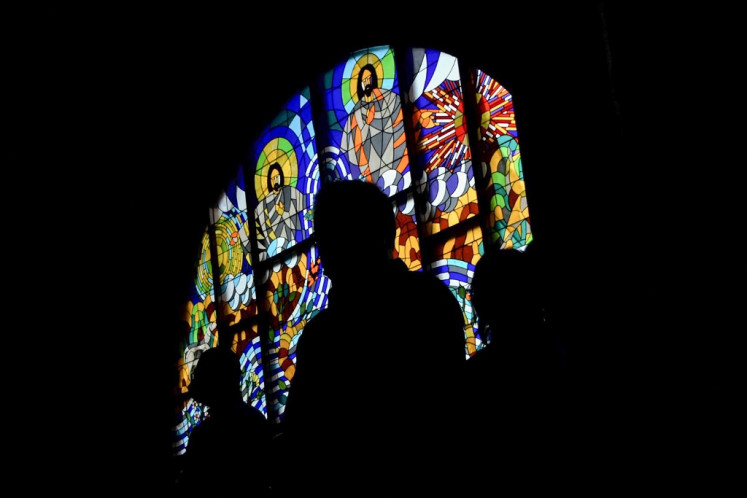Popular Reads
Top Results
Can't find what you're looking for?
View all search resultsPopular Reads
Top Results
Can't find what you're looking for?
View all search resultsAfter Idul Adha, where is animal waste disposed of?
Islam’s Day of Sacrifice is celebrated by slaughtering livestock, especially cattle, but the lack of attention to animal carcass disposal might leave a bad aftertaste.
Change text size
Gift Premium Articles
to Anyone
E
ight men surrounded a brown cow tied to a pole on Thursday morning while dozens of spectators formed a ring around the group on Jl. Syahdan in Palmerah, West Jakarta.
After the men had finally managed to pin the animal down after 10 minutes, those gathered uttered praises to God as the men slit the cow’s throat. They then cleaned up the blood that spurted all over the street.
“This is what happens every year,” Taufik Mansyur, a 51-year-old board member of Musholla Al-Ikhlas, a prayer house in Palmerah, told The Jakarta Post after the qurban, which refers to both the ritual slaughter and sacrificial animals.
Taufik joined millions of other Muslims across the country on Thursday to celebrate Idul Adha, the Day of Sacrifice, by slaughtering cattle, goats and sheep, and then distributing the mean among local residents and the poor.
But the holy feast might leave a bad aftertaste, as the waste from animal carcasses, including body parts and excrement, is simply dumped into local waterways, creating a hazard to both the environmental and human health.
The Jakarta Environmental Agency has been calling on local mosques and residents to properly dispose of the carcasses and other waste from the slaughtered animals, because many often dump these into drains and even rivers to contaminate the water and harm their ecosystem.
“Simply put, the fish in waterways will die if the waste of sacrificial animals are dumped there,” agency head Asep Kuswanto said on June 23, as quoted by CNN Indonesia.
The practice could also harm public health, Asep added, by creating a medium for pathogens to multiply and transmit various diseases from the slaughtered animals, such as hepatitis, typhus and foot-and-mouth disease.
Disposing of the carcasses and waste of animals slaughtered for Idul Adha into waterways is an issue that reoccurs every year. Despite yearly prohibitions against the practice, Pantas Nainggolan, a member of Commission D of the Jakarta Legislative Council (DPRD), said he had found little progress so far.
“The local administration has not been consistent in its supervision, [it is] not strict enough,” Pantas said on Monday, as quoted by Tempo.co.
“Just because it happens [only] once a year, should we tolerate it?” he added.
So this year, Pantas hoped for tighter supervision by the Jakarta administration or even the provision of alternative sites for disposing of the carcasses, body parts and waste.
But keeping a close eye on the qurban ritual for Idul Adhal can be difficult because of its communal nature and the fact that 86 percent of Indonesia’s population of over 273 million people, or 234.8 million, are Muslims.
During the holiday, each mosque and musholla holds its own ritual slaughter, whether in an open field or, in the case of Musholla Al-Ikhlas, on the side of a road.
“We have to share the qurban we received from donors to the other musholla along this road so [the ritual] doesn’t block the traffic,” Taufik said.
Even though Indonesia’s culinary tradition includes dishes made from animal heads and offal, the carcasses and waste from animals slaughtered across the country still add up.
One notable incident occurred in 2018, when hundreds of animal body parts clogged Jakarta’s Cipinang River after Idul Adha.
Institutions like Muhammadiyah, the country’s second largest Muslim organization, have been advising that the actual slaughter be performed by slaughterhouses (RPH) for better distribution and waste management.
“The Muhammadiyah Central Office (PP) has instructed to not hold any [ritual slaughter] here, because we are concerned about [crowd control] and unmanageable waste,” Zainal Abidin, a board member at the Muhammadiyah Mosque Welfare Council, told the Post on Wednesday.
The group’s Environment Council has also urged people to conduct the qurban at slaughterhouses where possible and not in the nearest open space, where “the meat can mix with excrement and there is usually no waste disposal [system] available," said Zainal.
“Usually, the dung of the slaughtered cattle can be used for compost. But since the ritual calls for a speedy process and draws many local people who want to watch, it can be tough to manage sanitation,” he added.
For a small musholla like Al-Ikhlas, Taufik had to rely on local residents to help with the ritual, even if it involved slaughtering just one cow and one goat.
“We have prepared ten plastic bags for the waste, so we put all the cow dung inside the bags and then the pasukan oranye [orange troops] will come here and pick them up,” Taufik said, referring to personnel from Jakarta’s Public Facility Maintenance Agency (PPSU), so named for their bright orange uniforms.
“We always give them extra cash as well as meat [...] from the slaughtered cattle,” he added. “This way, no waste will be left here, not even the bad smell.”
The government has issued guidelines on handling animal waste in Environment and Forestry Ministerial Regulation No. 90/2016 on standards for community services at public facilities. The ministry also suggests two waste management methods: composting or burying the animal carcasses in a large pit.
“These [matters] are always tough. Thankfully, since this musholla is managed by the entire neighborhood, it’s easier to be mindful [of the environment],” Taufik said.










